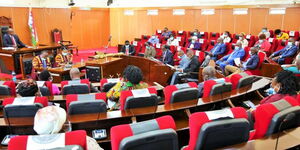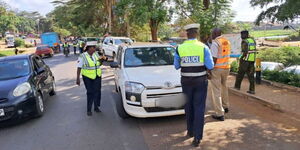Matatu owners have protested what they term as unfair tax demand by Kenya Revenue Authority (KRA) even as the industry suffers from reduced income in collected fares.
KRA collects annual taxes from matatus per passenger seat but the matatus argue the arrangement should be adjusted to account for reduced seat capacity that has hit the sector since the start of the Covid-19 pandemic.
Matatu Owners Association (MOA) Chairman Simon Kimutai argues that the authority has failed to consider the new seating arrangement by the vehicles that has led to a reduced number of passengers per trip.
He was speaking after he forwarded a memorandum to KRA where he demanded a review of the advanced taxes.
"The KRA is still demanding Ksh720 per seat per year or Ksh10,080 for a 14-seater matatu whose capacity has been reduced to nine seats, while 41-seater buses that pay Ksh29,520 per annum have had their capacity reduced to 25 passengers," he stated.
Kimutai failed to understand why the government was charging tax per seat yet did not allow the vehicles to carry passengers to full capacity.
"We did not mind paying taxes, but we wonder why we are being overlooked when other sectors have been given a reprieve," he added.
Kimutai explained that a 33-seater bus was carrying a maximum of 17 passengers and still paying Ksh23,760 per annum while 26-seaters which was now limited to 15 passengers, are still paying Ksh18,720 in advanced tax.
In April, the government directed matatus to carry 60 percent of their capacities to allow social distancing among passengers.
The industry has been experiencing huge losses as a result of the containment measures that also require them to provide sanitisers for passengers.
They lamented that other transport sectors like the standard gauge railway and international flights had been allowed to carry to full capacity.
“We have already attained all the requirements by the government and we wonder why we have not been allowed to operate full capacity like the other sectors,” Lower Eastern Transport Welfare Association chairman Onesmus Kyalo stated in a past interview.












